University Essay: Critical Review of Entrepreneurship in Business
VerifiedAdded on 2023/01/16
|6
|1351
|75
Essay
AI Summary
This essay offers a critical review of entrepreneurship, drawing on multiple articles to analyze key concepts. It explores how innovation and digital transformation impact entrepreneurial mindsets, highlighting the importance of unconventional thinking and access to resources. The essay also defines entrepreneurship as an organizational process, emphasizing personal capabilities and market opportunities. It discusses historical approaches, including the dynamics of capitalism and industrial change. Furthermore, it examines resource constraints faced by organizations, and how they can overcome these to foster growth. Finally, the essay emphasizes the role of passion in entrepreneurship, exploring its motivational qualities and impact on entrepreneurial actions. The essay references several key articles and concludes with a synthesis of the core attributes of entrepreneurship.

bba220
Paraphrase This Document
Need a fresh take? Get an instant paraphrase of this document with our AI Paraphraser
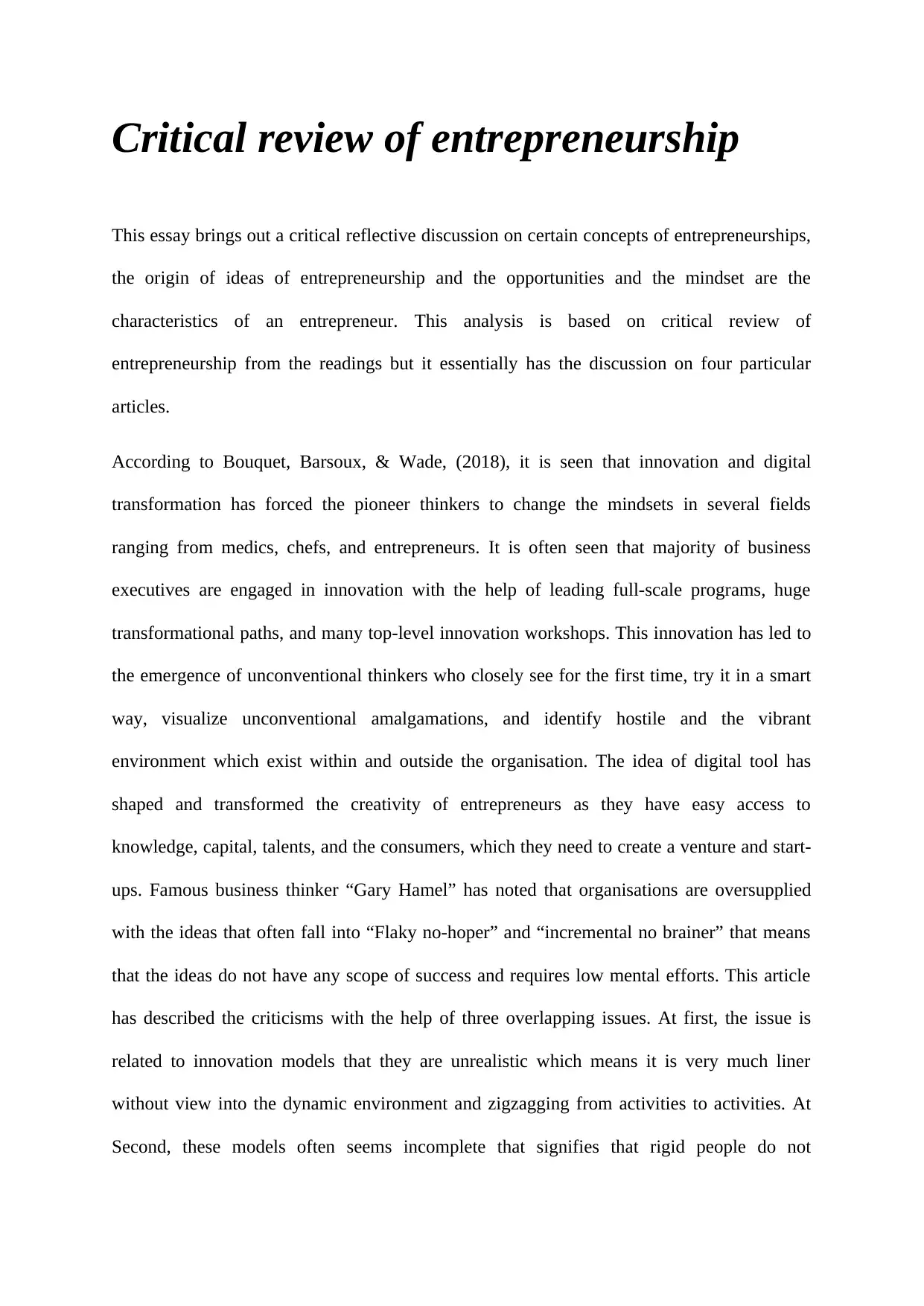
Critical review of entrepreneurship
This essay brings out a critical reflective discussion on certain concepts of entrepreneurships,
the origin of ideas of entrepreneurship and the opportunities and the mindset are the
characteristics of an entrepreneur. This analysis is based on critical review of
entrepreneurship from the readings but it essentially has the discussion on four particular
articles.
According to Bouquet, Barsoux, & Wade, (2018), it is seen that innovation and digital
transformation has forced the pioneer thinkers to change the mindsets in several fields
ranging from medics, chefs, and entrepreneurs. It is often seen that majority of business
executives are engaged in innovation with the help of leading full-scale programs, huge
transformational paths, and many top-level innovation workshops. This innovation has led to
the emergence of unconventional thinkers who closely see for the first time, try it in a smart
way, visualize unconventional amalgamations, and identify hostile and the vibrant
environment which exist within and outside the organisation. The idea of digital tool has
shaped and transformed the creativity of entrepreneurs as they have easy access to
knowledge, capital, talents, and the consumers, which they need to create a venture and start-
ups. Famous business thinker “Gary Hamel” has noted that organisations are oversupplied
with the ideas that often fall into “Flaky no-hoper” and “incremental no brainer” that means
that the ideas do not have any scope of success and requires low mental efforts. This article
has described the criticisms with the help of three overlapping issues. At first, the issue is
related to innovation models that they are unrealistic which means it is very much liner
without view into the dynamic environment and zigzagging from activities to activities. At
Second, these models often seems incomplete that signifies that rigid people do not
This essay brings out a critical reflective discussion on certain concepts of entrepreneurships,
the origin of ideas of entrepreneurship and the opportunities and the mindset are the
characteristics of an entrepreneur. This analysis is based on critical review of
entrepreneurship from the readings but it essentially has the discussion on four particular
articles.
According to Bouquet, Barsoux, & Wade, (2018), it is seen that innovation and digital
transformation has forced the pioneer thinkers to change the mindsets in several fields
ranging from medics, chefs, and entrepreneurs. It is often seen that majority of business
executives are engaged in innovation with the help of leading full-scale programs, huge
transformational paths, and many top-level innovation workshops. This innovation has led to
the emergence of unconventional thinkers who closely see for the first time, try it in a smart
way, visualize unconventional amalgamations, and identify hostile and the vibrant
environment which exist within and outside the organisation. The idea of digital tool has
shaped and transformed the creativity of entrepreneurs as they have easy access to
knowledge, capital, talents, and the consumers, which they need to create a venture and start-
ups. Famous business thinker “Gary Hamel” has noted that organisations are oversupplied
with the ideas that often fall into “Flaky no-hoper” and “incremental no brainer” that means
that the ideas do not have any scope of success and requires low mental efforts. This article
has described the criticisms with the help of three overlapping issues. At first, the issue is
related to innovation models that they are unrealistic which means it is very much liner
without view into the dynamic environment and zigzagging from activities to activities. At
Second, these models often seems incomplete that signifies that rigid people do not
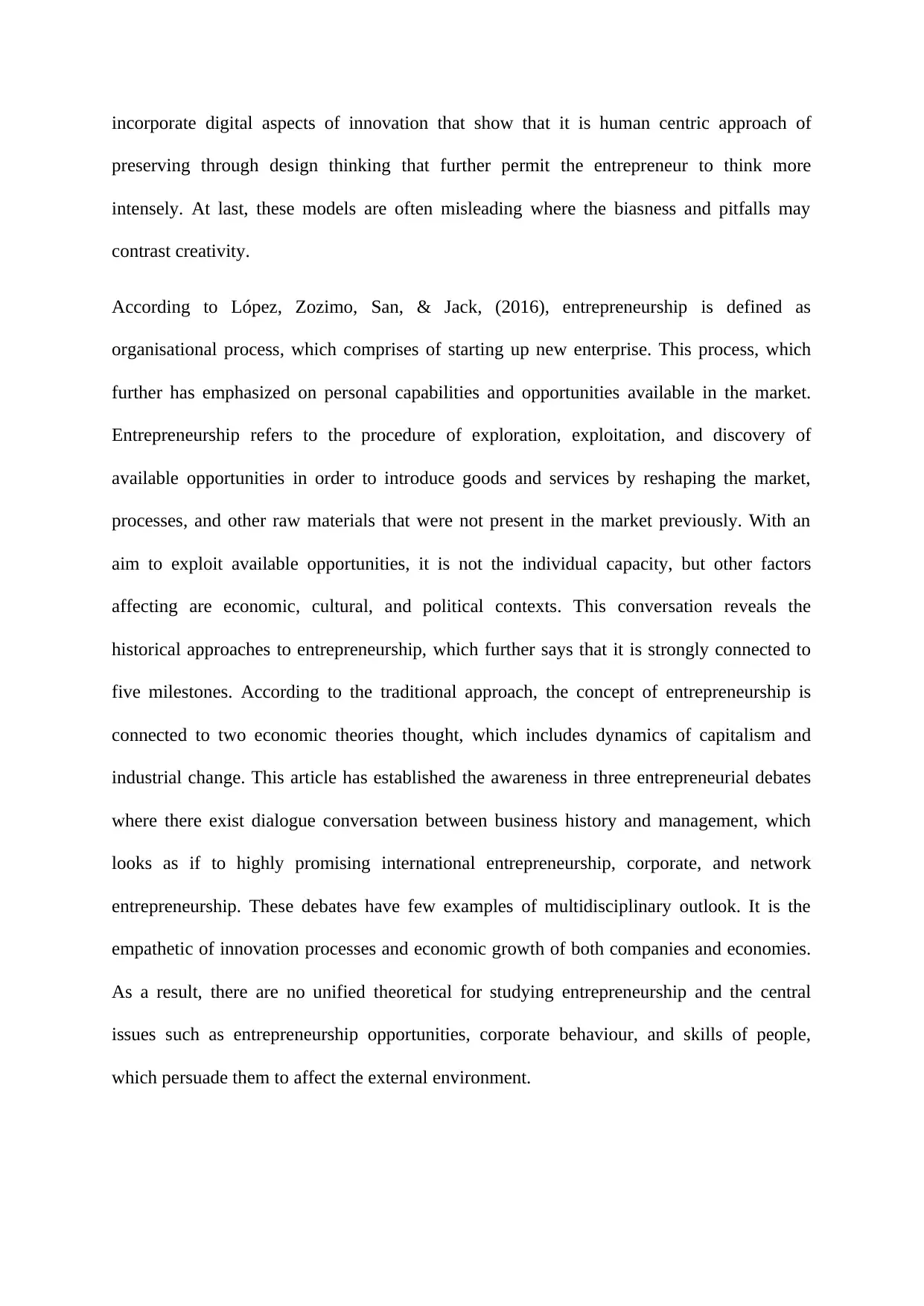
incorporate digital aspects of innovation that show that it is human centric approach of
preserving through design thinking that further permit the entrepreneur to think more
intensely. At last, these models are often misleading where the biasness and pitfalls may
contrast creativity.
According to López, Zozimo, San, & Jack, (2016), entrepreneurship is defined as
organisational process, which comprises of starting up new enterprise. This process, which
further has emphasized on personal capabilities and opportunities available in the market.
Entrepreneurship refers to the procedure of exploration, exploitation, and discovery of
available opportunities in order to introduce goods and services by reshaping the market,
processes, and other raw materials that were not present in the market previously. With an
aim to exploit available opportunities, it is not the individual capacity, but other factors
affecting are economic, cultural, and political contexts. This conversation reveals the
historical approaches to entrepreneurship, which further says that it is strongly connected to
five milestones. According to the traditional approach, the concept of entrepreneurship is
connected to two economic theories thought, which includes dynamics of capitalism and
industrial change. This article has established the awareness in three entrepreneurial debates
where there exist dialogue conversation between business history and management, which
looks as if to highly promising international entrepreneurship, corporate, and network
entrepreneurship. These debates have few examples of multidisciplinary outlook. It is the
empathetic of innovation processes and economic growth of both companies and economies.
As a result, there are no unified theoretical for studying entrepreneurship and the central
issues such as entrepreneurship opportunities, corporate behaviour, and skills of people,
which persuade them to affect the external environment.
preserving through design thinking that further permit the entrepreneur to think more
intensely. At last, these models are often misleading where the biasness and pitfalls may
contrast creativity.
According to López, Zozimo, San, & Jack, (2016), entrepreneurship is defined as
organisational process, which comprises of starting up new enterprise. This process, which
further has emphasized on personal capabilities and opportunities available in the market.
Entrepreneurship refers to the procedure of exploration, exploitation, and discovery of
available opportunities in order to introduce goods and services by reshaping the market,
processes, and other raw materials that were not present in the market previously. With an
aim to exploit available opportunities, it is not the individual capacity, but other factors
affecting are economic, cultural, and political contexts. This conversation reveals the
historical approaches to entrepreneurship, which further says that it is strongly connected to
five milestones. According to the traditional approach, the concept of entrepreneurship is
connected to two economic theories thought, which includes dynamics of capitalism and
industrial change. This article has established the awareness in three entrepreneurial debates
where there exist dialogue conversation between business history and management, which
looks as if to highly promising international entrepreneurship, corporate, and network
entrepreneurship. These debates have few examples of multidisciplinary outlook. It is the
empathetic of innovation processes and economic growth of both companies and economies.
As a result, there are no unified theoretical for studying entrepreneurship and the central
issues such as entrepreneurship opportunities, corporate behaviour, and skills of people,
which persuade them to affect the external environment.
⊘ This is a preview!⊘
Do you want full access?
Subscribe today to unlock all pages.

Trusted by 1+ million students worldwide
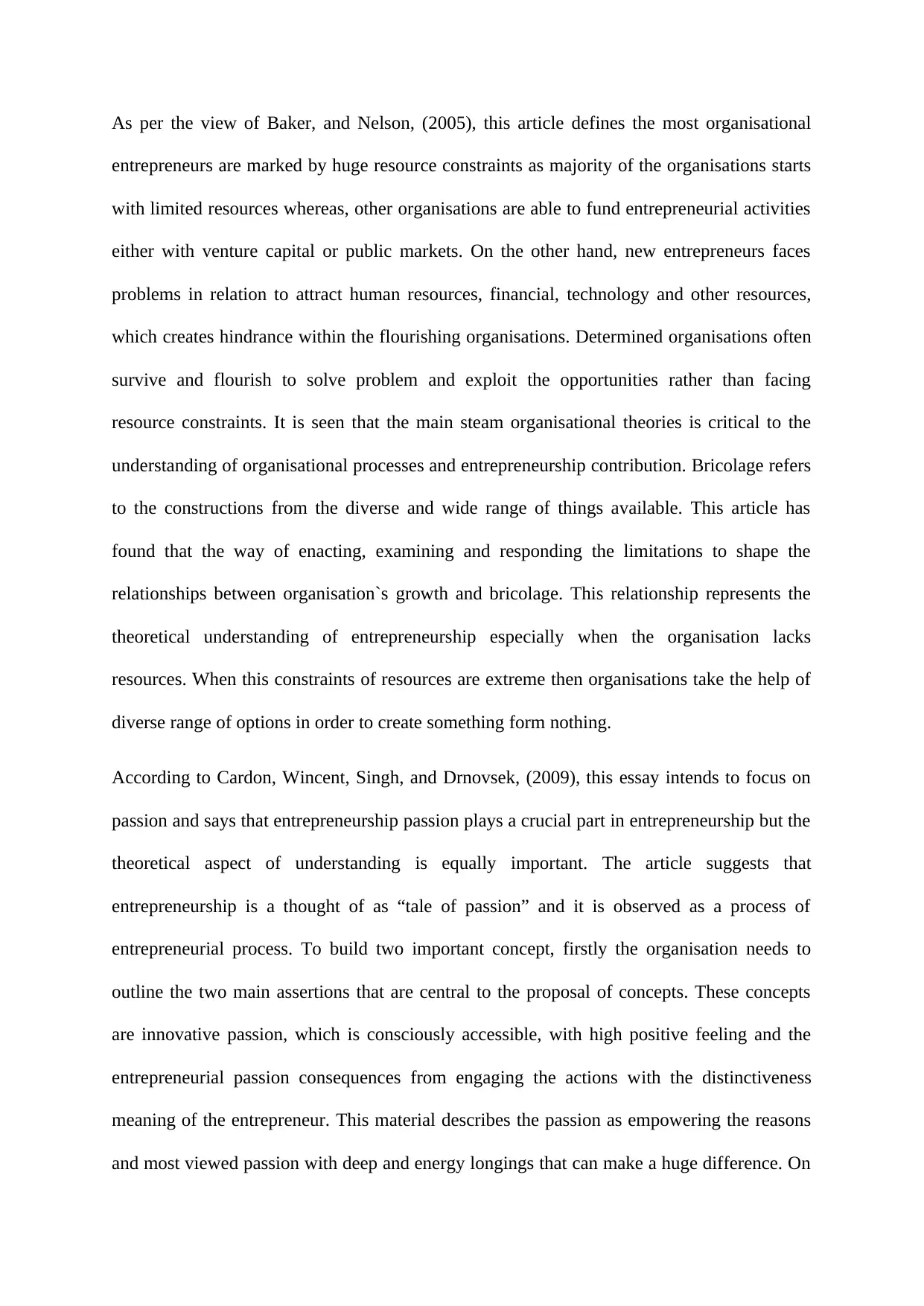
As per the view of Baker, and Nelson, (2005), this article defines the most organisational
entrepreneurs are marked by huge resource constraints as majority of the organisations starts
with limited resources whereas, other organisations are able to fund entrepreneurial activities
either with venture capital or public markets. On the other hand, new entrepreneurs faces
problems in relation to attract human resources, financial, technology and other resources,
which creates hindrance within the flourishing organisations. Determined organisations often
survive and flourish to solve problem and exploit the opportunities rather than facing
resource constraints. It is seen that the main steam organisational theories is critical to the
understanding of organisational processes and entrepreneurship contribution. Bricolage refers
to the constructions from the diverse and wide range of things available. This article has
found that the way of enacting, examining and responding the limitations to shape the
relationships between organisation`s growth and bricolage. This relationship represents the
theoretical understanding of entrepreneurship especially when the organisation lacks
resources. When this constraints of resources are extreme then organisations take the help of
diverse range of options in order to create something form nothing.
According to Cardon, Wincent, Singh, and Drnovsek, (2009), this essay intends to focus on
passion and says that entrepreneurship passion plays a crucial part in entrepreneurship but the
theoretical aspect of understanding is equally important. The article suggests that
entrepreneurship is a thought of as “tale of passion” and it is observed as a process of
entrepreneurial process. To build two important concept, firstly the organisation needs to
outline the two main assertions that are central to the proposal of concepts. These concepts
are innovative passion, which is consciously accessible, with high positive feeling and the
entrepreneurial passion consequences from engaging the actions with the distinctiveness
meaning of the entrepreneur. This material describes the passion as empowering the reasons
and most viewed passion with deep and energy longings that can make a huge difference. On
entrepreneurs are marked by huge resource constraints as majority of the organisations starts
with limited resources whereas, other organisations are able to fund entrepreneurial activities
either with venture capital or public markets. On the other hand, new entrepreneurs faces
problems in relation to attract human resources, financial, technology and other resources,
which creates hindrance within the flourishing organisations. Determined organisations often
survive and flourish to solve problem and exploit the opportunities rather than facing
resource constraints. It is seen that the main steam organisational theories is critical to the
understanding of organisational processes and entrepreneurship contribution. Bricolage refers
to the constructions from the diverse and wide range of things available. This article has
found that the way of enacting, examining and responding the limitations to shape the
relationships between organisation`s growth and bricolage. This relationship represents the
theoretical understanding of entrepreneurship especially when the organisation lacks
resources. When this constraints of resources are extreme then organisations take the help of
diverse range of options in order to create something form nothing.
According to Cardon, Wincent, Singh, and Drnovsek, (2009), this essay intends to focus on
passion and says that entrepreneurship passion plays a crucial part in entrepreneurship but the
theoretical aspect of understanding is equally important. The article suggests that
entrepreneurship is a thought of as “tale of passion” and it is observed as a process of
entrepreneurial process. To build two important concept, firstly the organisation needs to
outline the two main assertions that are central to the proposal of concepts. These concepts
are innovative passion, which is consciously accessible, with high positive feeling and the
entrepreneurial passion consequences from engaging the actions with the distinctiveness
meaning of the entrepreneur. This material describes the passion as empowering the reasons
and most viewed passion with deep and energy longings that can make a huge difference. On
Paraphrase This Document
Need a fresh take? Get an instant paraphrase of this document with our AI Paraphraser
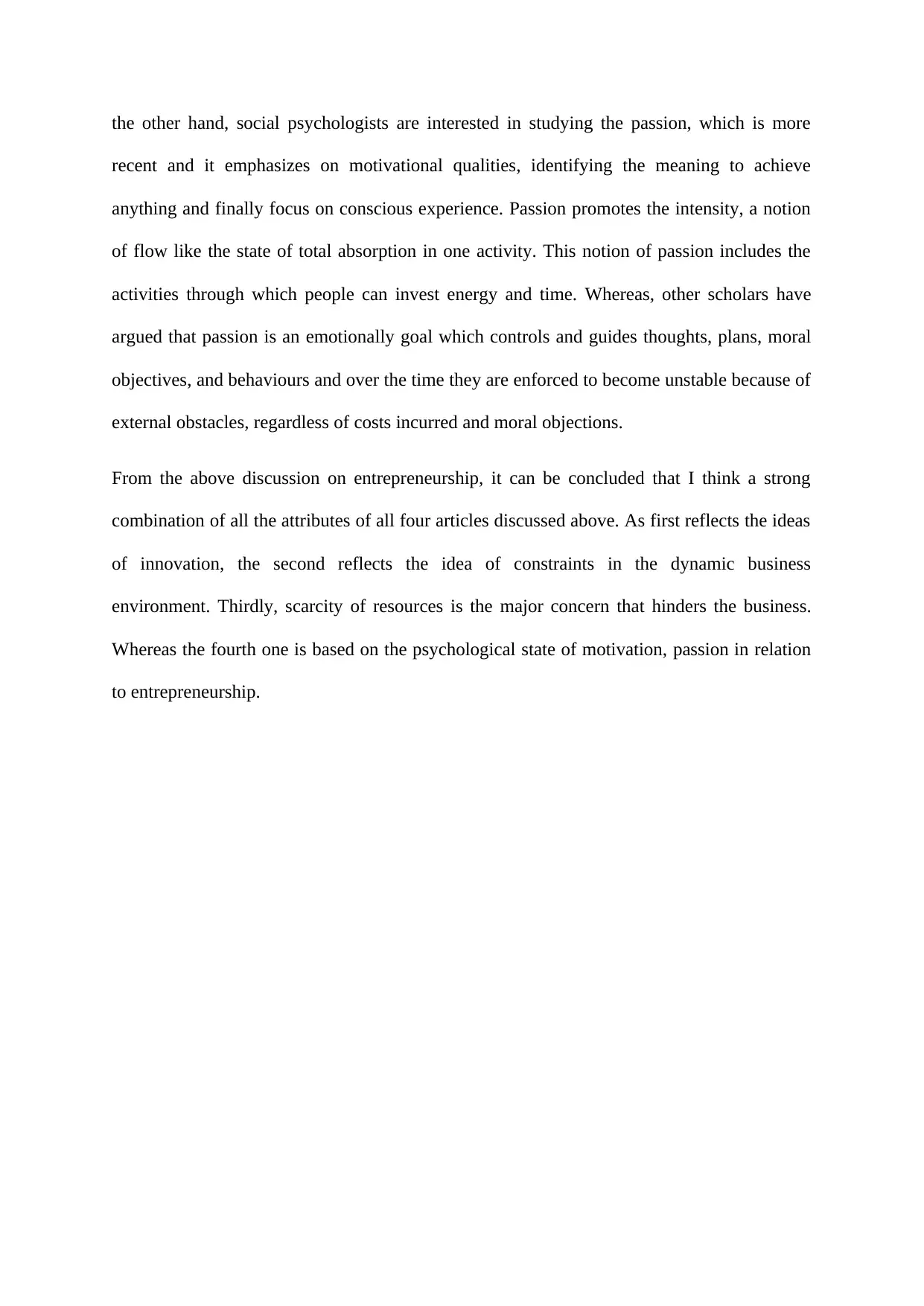
the other hand, social psychologists are interested in studying the passion, which is more
recent and it emphasizes on motivational qualities, identifying the meaning to achieve
anything and finally focus on conscious experience. Passion promotes the intensity, a notion
of flow like the state of total absorption in one activity. This notion of passion includes the
activities through which people can invest energy and time. Whereas, other scholars have
argued that passion is an emotionally goal which controls and guides thoughts, plans, moral
objectives, and behaviours and over the time they are enforced to become unstable because of
external obstacles, regardless of costs incurred and moral objections.
From the above discussion on entrepreneurship, it can be concluded that I think a strong
combination of all the attributes of all four articles discussed above. As first reflects the ideas
of innovation, the second reflects the idea of constraints in the dynamic business
environment. Thirdly, scarcity of resources is the major concern that hinders the business.
Whereas the fourth one is based on the psychological state of motivation, passion in relation
to entrepreneurship.
recent and it emphasizes on motivational qualities, identifying the meaning to achieve
anything and finally focus on conscious experience. Passion promotes the intensity, a notion
of flow like the state of total absorption in one activity. This notion of passion includes the
activities through which people can invest energy and time. Whereas, other scholars have
argued that passion is an emotionally goal which controls and guides thoughts, plans, moral
objectives, and behaviours and over the time they are enforced to become unstable because of
external obstacles, regardless of costs incurred and moral objections.
From the above discussion on entrepreneurship, it can be concluded that I think a strong
combination of all the attributes of all four articles discussed above. As first reflects the ideas
of innovation, the second reflects the idea of constraints in the dynamic business
environment. Thirdly, scarcity of resources is the major concern that hinders the business.
Whereas the fourth one is based on the psychological state of motivation, passion in relation
to entrepreneurship.
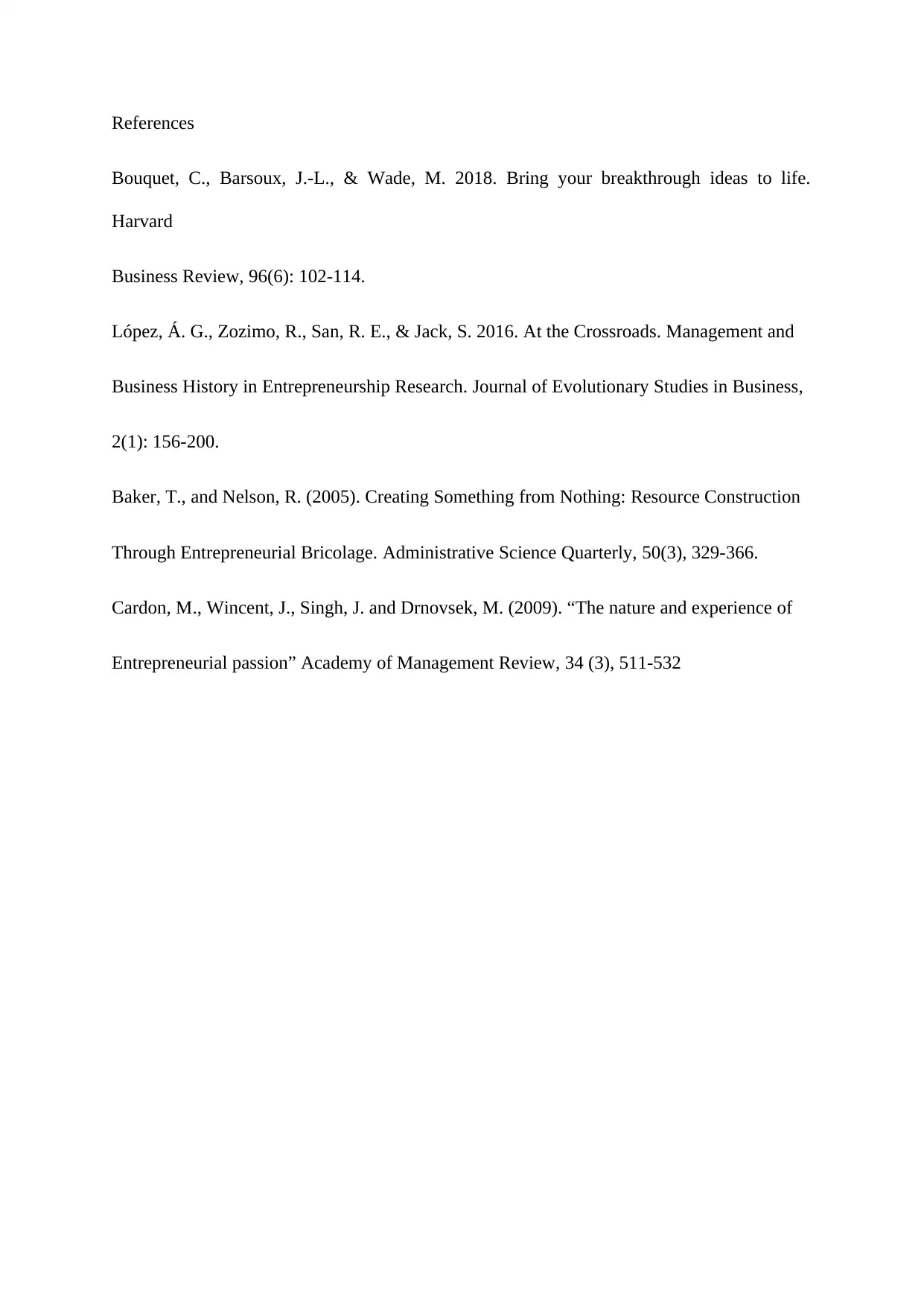
References
Bouquet, C., Barsoux, J.-L., & Wade, M. 2018. Bring your breakthrough ideas to life.
Harvard
Business Review, 96(6): 102-114.
López, Á. G., Zozimo, R., San, R. E., & Jack, S. 2016. At the Crossroads. Management and
Business History in Entrepreneurship Research. Journal of Evolutionary Studies in Business,
2(1): 156-200.
Baker, T., and Nelson, R. (2005). Creating Something from Nothing: Resource Construction
Through Entrepreneurial Bricolage. Administrative Science Quarterly, 50(3), 329-366.
Cardon, M., Wincent, J., Singh, J. and Drnovsek, M. (2009). “The nature and experience of
Entrepreneurial passion” Academy of Management Review, 34 (3), 511-532
Bouquet, C., Barsoux, J.-L., & Wade, M. 2018. Bring your breakthrough ideas to life.
Harvard
Business Review, 96(6): 102-114.
López, Á. G., Zozimo, R., San, R. E., & Jack, S. 2016. At the Crossroads. Management and
Business History in Entrepreneurship Research. Journal of Evolutionary Studies in Business,
2(1): 156-200.
Baker, T., and Nelson, R. (2005). Creating Something from Nothing: Resource Construction
Through Entrepreneurial Bricolage. Administrative Science Quarterly, 50(3), 329-366.
Cardon, M., Wincent, J., Singh, J. and Drnovsek, M. (2009). “The nature and experience of
Entrepreneurial passion” Academy of Management Review, 34 (3), 511-532
⊘ This is a preview!⊘
Do you want full access?
Subscribe today to unlock all pages.

Trusted by 1+ million students worldwide
1 out of 6
Related Documents
Your All-in-One AI-Powered Toolkit for Academic Success.
+13062052269
info@desklib.com
Available 24*7 on WhatsApp / Email
![[object Object]](/_next/static/media/star-bottom.7253800d.svg)
Unlock your academic potential
Copyright © 2020–2026 A2Z Services. All Rights Reserved. Developed and managed by ZUCOL.




